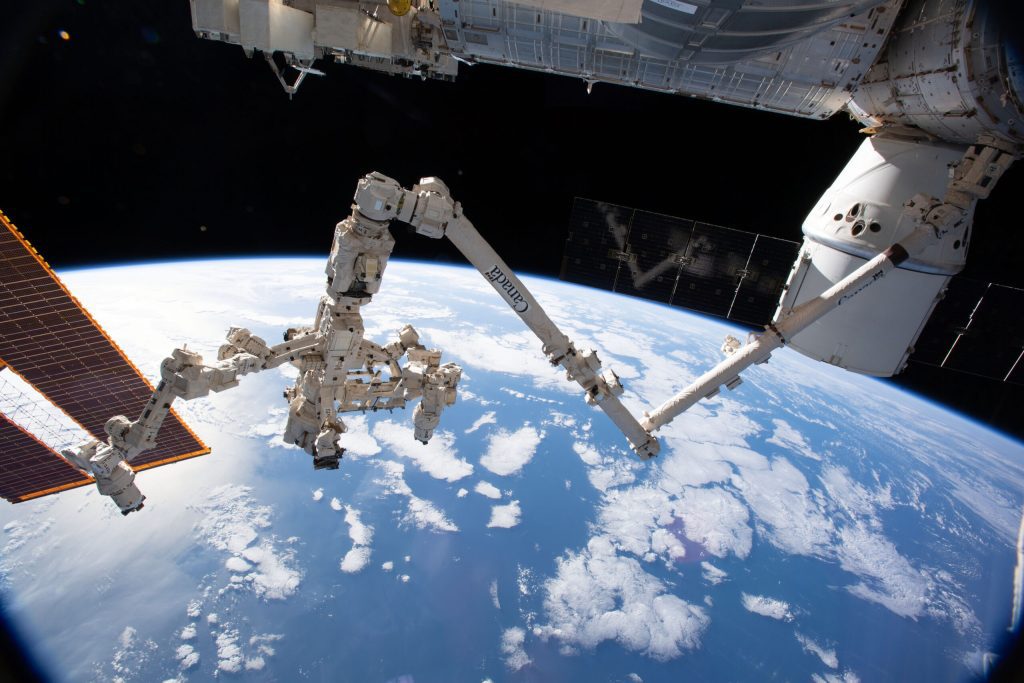The Canadian Space Agency (CSA) has given MDA Space a contract extension worth about $182 million to continue supporting robotics operations on the International Space Station until 2030.
The contract now also includes responsibilities for controlling robotics during flights, in addition to the operational support MDA Space has provided for the Mobile Servicing System on the ISS since 2001.
MDA Space has previously only provided training to CSA and NASA staff for operating this system, which includes the space station’s 17-meter Canadarm2 robotic arm, along with mission planning and engineering support.
Most of the ISS's robotic operations are carried out by flight controllers on the ground. They support the docking of visiting spacecraft, the movement and maintenance of equipment around the station, surveilling the station for damage, and aiding astronauts during spacewalks.
Starting from January 2025, MDA Space will manage the robotic operations with a team initially based at the CSA mission control center in Quebec, Canada.
Commercial push
Flight controller support is also a part of a new series of modular robotic technologies and services MDA Space introduced on April 10 called Skymaker, intended to help the company seize emerging commercial opportunities after years of government work.
The company is offering to operate Skymaker technology on behalf of customers from its recently opened mission control center in Ontario, Canada.
MDA Space vice president of robotics and space operations, Holly Johnson, mentioned in an interview that customers do not need to become experts in space robotics and operations or go through the learning curve that the company has experienced. Instead, MDA Space is packaging this expertise into a complete mission services and operations offering.
Skymaker consists of a set of components for robotic arms with lengths ranging from one to over 15 meters.
The company is observing an increase in demand for space robotics in the commercial market, according to Johnson.
Last year, MDA Space secured contracts to construct the grapple fixtures and anchor point interfaces needed by Axiom’s proposed commercial space station to be compatible with robotics.
The company is also providing robotics for one of the commercial teams NASA recently selected to work on ideas for a lunar rover that could be offered as a service.
The company has a number of ongoing conversations with customers interested in on-orbit servicing, in-space assembly, and in-space manufacturing, according to Johnson.
MDA Space has historically been recognized for delivering large-scale and customized high-performance robotic systems, such as Canadarm2. SpaceNews.
But Johnson stated that Skymaker addresses the demand for a greater variety of robotics needs, including those covering different lengths and strengths.
“We can reach around the corner or walk around the station,” she added, “and our robotics can be one meter long to more than 15 meters long.”
“Some robotics require dexterous handling, others require crane-like operations, and so with our scalable solution we’re telling our customers: Let us do the heavy or the light lifting.”
Based on what Johnson said, Skymaker is best for spacecraft that are at least the size of a dishwasher.
Government support
MDA Space is currently creating a robotic arm system for the planned United States-led Gateway space station around the Moon, which represents Canada’s contribution to the program.
Canada’s ISS robotics extension news follows the government's proposal for the formation of a National Space Council, as part of a “new whole-of-government approach” to space exploration, technology development, and research.”
entire-of-government approach The council was introduced as part of Canada’s 2024 budget request, which includes approximately $6 million in 2024-25 to Canada’s space agency for the Lunar Exploration Accelerator Program (LEAP), focusing on science and technology activities in lunar orbit, on the Moon’s surface, and beyond. The Skymaker announcement is also a key part of the broader transformation for MDA Space, a provider of robotics, satellite systems, and geointelligence that was listed on the Toronto Stock Exchange after being separated from Maxar Technologies in 2020.
The company was established nearly 55 years ago as MacDonald, Dettwiler and Associates.
The company rebranded as MDA Space on March 7 and a few weeks later named its software-defined satellite product line Aurora.
Canada's geostationary operator Telesat, which is Aurora’s main customer, has ordered an initial 198 satellites for its low Earth orbit broadband network Lightspeed under a contract worth about $1.6 billion. SpaceX is set to commence launching the satellites in 2026.
Since becoming a public company four years ago after separating from Maxar, Johnson mentioned that MDA Space has been “able to invest heavily in the next generation of products, in roadmaps, and technologies” across all its business areas.
The company’s space robotics rivals include Maxar, U.S.-based Redwire, and GITAI of Japan.
The Canadian Space Agency has granted MDA Space a contract extension worth approximately $182 million to continue supporting robotics operations on the International Space Station until 2030.
The company’s space robotics competitors include Maxar, U.S.-based Redwire, and GITAI of Japan.









